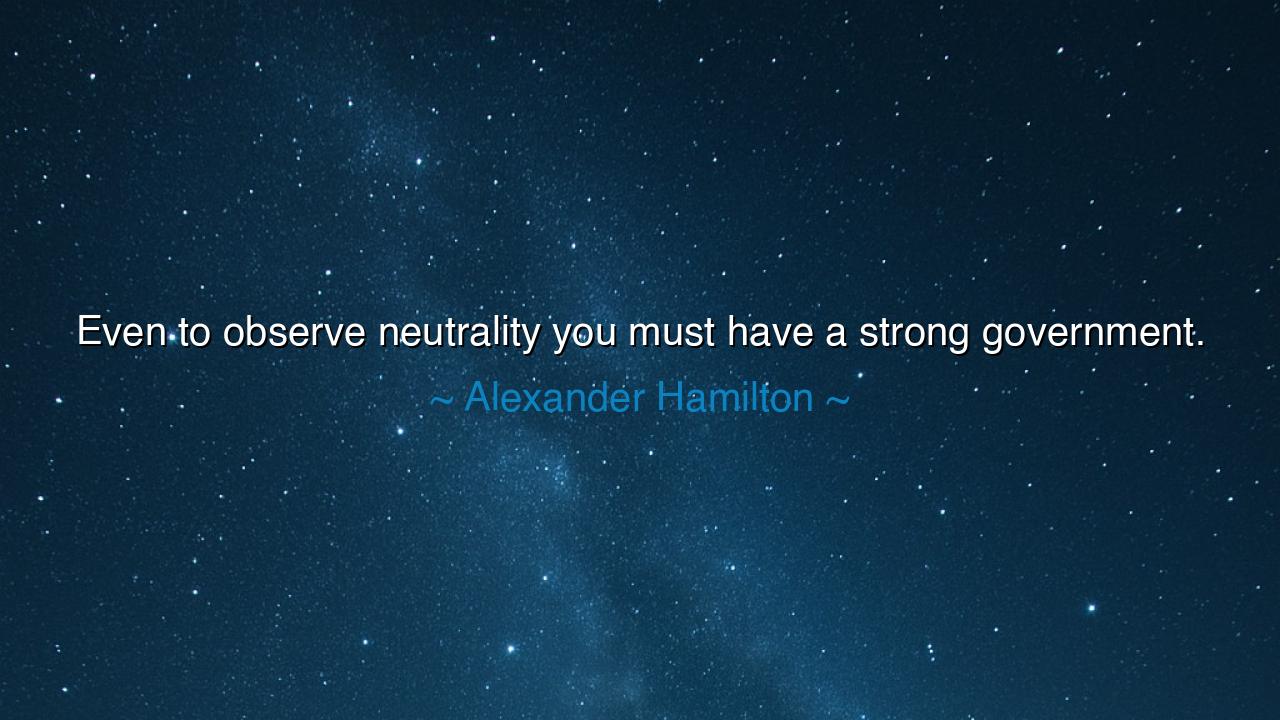
Even to observe neutrality you must have a strong government.






The immortal statesman Alexander Hamilton, architect of America’s financial system and defender of its Constitution, once declared: “Even to observe neutrality you must have a strong government.” These words, though born in the storms of the eighteenth century, carry wisdom as timeless as the tides. They speak not merely of nations, but of the very nature of strength and peace — that neutrality is not weakness, but a position that demands power, discipline, and unity. For only the strong can stand apart from the fury of rival powers and hold their ground unmoved; the weak are swept away by the ambitions of others, their neutrality nothing more than silence forced by fear.
To understand the meaning of this quote, one must first grasp Hamilton’s vision of strength. He lived in an age when America was young, fragile, and surrounded by empires — Britain, France, and Spain — all of whom sought to shape her destiny. Many of his countrymen believed that neutrality — avoiding foreign entanglements and wars — would preserve their newfound freedom. Yet Hamilton, ever the realist, saw deeper. He knew that neutrality is not a refuge for the weak, but a burden for the strong. A nation cannot declare neutrality if it lacks the means to defend its borders, enforce its laws, and command respect among nations. Without strength, neutrality becomes surrender disguised as peace.
The origin of Hamilton’s statement lies in the early years of the United States, when President George Washington issued his famous Proclamation of Neutrality in 1793. The world was aflame with war between Britain and revolutionary France, and both sought to drag the new republic into their struggle. Hamilton, serving as Secretary of the Treasury, supported Washington’s decision — but with a warning: neutrality could only endure if backed by a government capable of enforcing it. If America wished to remain at peace, it needed unity at home, firmness in leadership, and credibility abroad. Weakness, he argued, would invite violation, for great powers do not respect the neutrality of nations they can easily dominate.
History has often proven Hamilton’s wisdom. Consider the fate of Belgium in 1914. Declared a neutral nation by treaty, Belgium trusted that its neutrality would protect it from the fires of the Great War. Yet when Germany marched westward, treaties became dust and neutrality a hollow word. Lacking the strength to defend itself, Belgium was trampled beneath the boots of empire. Neutrality, unsupported by power, became tragedy. In contrast, nations like Switzerland, armed, disciplined, and resolute, preserved their neutrality through strength. Their peace was not given — it was earned, and defended by the readiness of a people united under strong governance.
Hamilton’s insight reaches beyond nations; it touches the moral and personal spheres of life as well. For even an individual who wishes to remain neutral amid conflict, whether political, social, or spiritual, must possess inner strength and clarity. To stay balanced in a world of extremes, one must be anchored in conviction. Neutrality without courage is cowardice; neutrality founded on principle is wisdom. In this sense, Hamilton’s words remind us that peace — whether between nations or within souls — does not arise from inaction, but from discipline, courage, and order.
The lesson of this quote, therefore, is that peace and neutrality require vigilance. A nation that desires to avoid war must still prepare for it; a people who desire harmony must still uphold justice. The government, to protect its citizens and its sovereignty, must be strong — not oppressive, but steadfast; not tyrannical, but capable. Weakness tempts aggression; strength commands respect. This is as true in the affairs of state as it is in the conduct of life itself. The one who cannot defend his peace will soon lose it; the one who builds strength in times of calm will stand unbroken in times of storm.
And so, my child, remember the wisdom of Hamilton: neutrality is not the luxury of the frail, but the reward of the mighty. Whether you lead a nation or govern your own heart, do not mistake gentleness for fragility nor peace for passivity. Build your foundations in strength — in knowledge, in character, in unity — that you may remain unmoved by the chaos of the world. For the weak are blown where the winds command, but the strong, like the mountain, stand serene amid thunder. Such is the secret of true neutrality: not to flee from conflict, but to rise above it — firm, just, and unshaken beneath the heavens.






AAdministratorAdministrator
Welcome, honored guests. Please leave a comment, we will respond soon